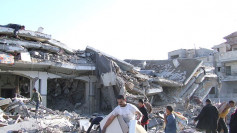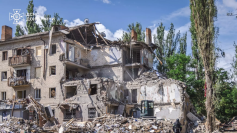Israeli Prime Minister Benjamin Netanyahu condemned Hamas on Friday after the militant group failed to return the body of Shiri Bibas, the mother of two young children killed while in captivity. Instead, Israel received what the Israel Defense Forces (IDF) described as an "anonymous body," sparking outrage and renewed tensions over the ongoing hostage negotiations.
Hamas had previously agreed to return the remains of Bibas and her two sons, Ariel (4) and Kfir (9 months), along with 84-year-old Oded Lifshitz, as part of the ongoing truce agreements mediated by Qatar and Egypt. However, forensic examinations determined that only the bodies of Ariel, Kfir, and Lifshitz had been returned, while Hamas substituted an unidentified body in place of Bibas.
Accusing Hamas of a "cruel and wicked violation," Netanyahu said in a statement, ""We will ensure that Hamas pays the full price for this cruel and wicked violation of the agreement." He vowed to "act decisively to bring Shiri home." Israeli officials had previously accused Hamas of murdering Bibas and her children in November 2023, one month after they were taken hostage during the group's October 7 terrorist attack on Israel.
Hamas later claimed Bibas' remains had been "mixed with other bodies" after being buried under rubble from an Israeli airstrike. The group blamed the airstrike for the deaths of Bibas and her children, an assertion Israel rejects. Hamas also used the release of the bodies to stage a highly publicized event, displaying the coffins against banners claiming Israel was responsible for the deaths.
United Nations Secretary-General António Guterres denounced the manner in which Hamas orchestrated the handover. "Under international law, any handover of the remains of the deceased must comply with the prohibition of cruel, inhuman or degrading treatment, ensuring respect for the dignity of the deceased and their families," he wrote on X.
The International Committee of the Red Cross (ICRC), which facilitated the transfer, also expressed dissatisfaction. "The ICRC does not participate in sorting, screening, or examining the deceased - this is the responsibility of the parties to the conflict," it said in a statement. It also voiced concerns that the releases had not been conducted privately and with dignity.
The return of hostages and bodies has been a key part of the ceasefire agreement brokered last month, with further releases scheduled. On Saturday, Hamas is expected to release six living hostages, including Eliya Cohen, Omer Shem Tov, Omer Wenkert, Tal Shoham, Hisham Al-Sayed, and Avera Mengistu. Al-Sayed and Mengistu, both Israeli citizens, had been held by Hamas for over a decade after crossing into Gaza.
The far-right Israeli Finance Minister Bezalel Smotrich called Hamas' failure to return Bibas' body a "serious violation" of the agreement. "The only solution is the destruction of Hamas," he posted on X.
Meanwhile, violence continued in Israel and the West Bank, with a series of explosions targeting buses in central Israel on Thursday. Israeli Police spokesman Haim Sargrof stated that the explosive devices used were similar to those seen in West Bank attacks, though he declined to elaborate.
The attacks come as Israel intensifies military operations under Operation Iron Wall, aimed at dismantling militant groups operating in the northern West Bank. The International Rescue Committee said Thursday that the ongoing offensive has displaced thousands, destroyed infrastructure, and restricted the movement of civilians.
The United Nations Relief and Works Agency (UNRWA) also raised concerns, stating earlier this month that forced displacement of Palestinians in the northern West Bank is escalating at an alarming pace. Children are among the casualties of the operations, according to aid groups.






